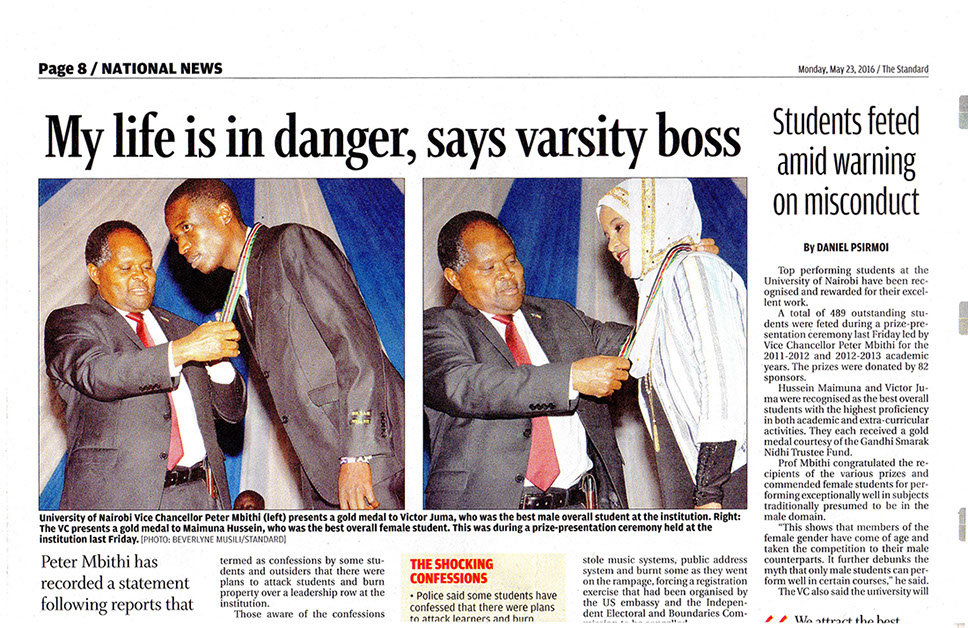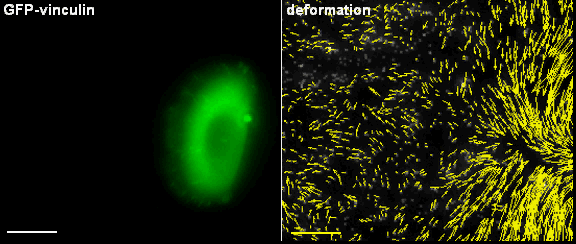12.2018
InCeM
Last and final deliverable D6.4 “PhD theses” published!
End of December 2018 is the official end of InCeM and we look back at four very successful years with 16 highly motivated Early Stage Researchers. All of them did a fantastic work and achieved relevant scientific data.
As a result, already 14 out of 16 are heading for a PhD in the near future. two theses have been submitted already, the other 12 will follow soon. A brief overview about their research topics is summarized in our last deliverable D6.4 “PhD theses” as the final result of Work Package 6 “Communication and dissemination”, which can be found here. We are very happy of having had such great scientist on board and now wish everybody all the best for Christmas and especially good luck for your future career!
11.2018
InCeM
A new publication of partner Forschungszentrum Jülich
We are happy to announce another publication of InCeM partner Forschungszentrum Jülich in the Biophysical Journal 115/9 (pp. 1770-1782).
Nanoscale Topography and Poroelastic Properties of Model Tissue Breast Gland Basement Membranes
Abstract of the article:
Basement membranes (BMs) are thin layers of condensed extracellular matrix proteins serving as permeability filters, cellular anchoring sites, and barriers against cancer cell invasion. It is believed that their biomechanical properties play a crucial role in determining cellular behavior and response, especially in mechanically active tissues like breast glands. Despite this, so far, relatively little attention has been dedicated to their analysis because of the difficulty of isolating and handling such thin layers of material. Here, we isolated BMs derived from MCF10A speroids – three-dimensional breast gland model systems mimicking in vitro the most relevant phenotypic characteristics of human breast lobules – and characterized them by atomic force microscopy, enhanced resolution confocal microscopy, and scanning electron microscopy. By performing atomic force microscopy height-clamp experiments, we obtained force-relaxation curves that offered the first biomechanical data on isolated breast gland BMs to our knowledge. Based on enhanced resolution confocal microscopy and scanning electron microscopy imaging data, we modeled the system as a polymer network immersed in liquid and described it as a poroelastic material. Finite-element simulations matching the experimental force-relaxation curves allowed for the first quantification, to our knowledge, of the bulk and shear moduli of the membrane as well as its water permeability. These results represent a first step towards a deeper understanding of the mechanism of tensional homeostasis regulating mammary gland activity as well as its disruption during processes of membrane breaching and metastatic invasion. (...more)
09.05.2018
University of Sussex
Figures from published article by Dr Sarfaraz and Prof Madzvamuse selected for cover of prestigious journal
Figures from a recently published article by Dr Wakil Sarfaraz, Doctoral Tutor in Mathematics and Anotida Madzvamuse, Professor of Mathematical and Computational Biology, have made it to the cover page of the International Journal of Bifurcation and Chaos.
Abstract of the article:
In this work an activator-depleted reaction–diffusion system is investigated on polar coordinates with the aim of exploring the relationship and the corresponding influence of domain size on the types of possible diffusion-driven instabilities. Quantitative relationships are found in the form of necessary conditions on the area of a disk-shape domain with respect to the diffusion and reaction rates for certain types of diffusion-driven instabilities to occur. Robust analytical methods are applied to find explicit expressions for the eigenvalues and eigenfunctions of the diffusion operator on a disk-shape domain with homogenous Neumann boundary conditions in polar coordinates. Spectral methods are applied using Chebyshev nonperiodic grid for the radial variable and Fourier periodic grid for the angular variable to verify the nodal lines and eigen-surfaces subject to the proposed analytical findings. The full classification of the parameter space in light of the bifurcation analysis is obtained and numerically verified by finding the solutions of the partitioning curves inducing such a classification. Spatiotemporal periodic behavior is demonstrated in the numerical solutions of the system for a proposed choice of parameters and a rigorous proof of the existence of infinitely many such points in the parameter plane is presented under a restriction on the area of the domain, with a lower bound in terms of reaction–diffusion rates. (...more)
10.2017
InCeM
Invitation to the International Symposium Measuring and Modelling Cell Migration
We cordially invite you to the international symposium "Measuring and Modelling Cell Migration" which will take place from September 27nd to 28th 2018 at RWTH Aachen University.
The symposium intends to bring together researchers from the fields of medicine, biology, biophysics, computer science, and mathematics who share an interest in cell migration. The meeting aims to unite early stage researchers with advanced scientists from academia and industry and internationally acclaimed leaders for interdisciplinary discussions and personal exchange. While all participants are encouraged to present their data, we are happy to welcome the following renowned experts as keynote speakers:
• Julie Plastino, l'Institut Curie, Paris (France)
• Bill Bement, University of Wisconsin-Madison (USA)
• Jacky Goetz, Université Strasbourg (France)
• • Núria Gavara, Queen Mary University of London (United Kingdom)
The full program and updates will be posted on our website www.mm.rwth-aachen.de. Please register for the symposium as soon as possible and no later than September 14, 2018.
03.2018
InCeM
Deliverable D6.2 „Communication“ published!
Having achieved month 38 in our successful InCeM project, a new public deliverable has been compiled within Work Package 6 “Communication and dissemination”. Deliverable D6.2 “Communication” deals with the presentation of InCeM results at international conferences, symposia and workshops. Moreover we would like to provide a full overview of successful publications during the entire project duration. Last but not least we like to summarize the results achieved by the organisation and implementation of the international symposium “Measuring and Modelling Cell Migration” that took place in Vienna from 22 to 23 February 2018. In case you want to read the full report, please click here!
10.2017
InCeM
Invitation to the International Symposium Measuring and Modelling Cell Migration
We cordially invite you to the international symposium "Measuring and Modelling Cell Migration" which will take place from February 22nd to 23rd 2018 at Vienna University.
The symposium intends to bring together researchers from the fields of medicine, biology, biophysics, computer science, and mathematics who share an interest in cell migration. The meeting aims to unite early stage researchers with advanced scientists from academia and industry and internationally acclaimed leaders for interdisciplinary discussions and personal exchange. While all participants are encouraged to present their data, we are happy to welcome the following renowned experts as keynote speakers:
• Martial Balland, Université Grenoble Alpes (France)
• John Condeelis, Albert Einstein College of Medicine (USA)
• Jacques Demongeot, Université Grenoble Alpes (France)
• Peter Friedl, Radboud Institute for Molecular Life Sciences (The Netherlands)
• Pekka Lappalainen, University of Helsinki (Finland)
• Ulrich Schwarz, University of Heidelberg (Germany)
• Michael Sixt, Institute of Science and Technology (Austria)
• Vic Small, Austrian Academy of Sciences (Austria)
The full program and updates will be posted on our website www.mm.rwth-aachen.de. Please register for the symposium as soon as possible and no later than January 15, 2018.
05.2017
InCeM
D6.21 – New public deliverable!
As the InCeM project is now past its 30th month, a new public deliverable has been compiled within Work Package 6 “Communication and dissemination” to report on the project’s progress. In this deliverable, D6.1 “Communication I”, you can read up on all the different publications and presentations of scientific data which have been produced in the context of the InCeM project so far! You can get an overview of the different topics, researchers, and various conferences that they attended in their capacity as InCeM researchers.
Interested? You can read the full report here!
05.2017
InCeM
Next InCeM newsletter available!
Please find attached the next InCeM newsletter (edition May 2017) including some updates
PDF
07.04.2017
InCeM
Mechanobiology: How cells and tissues respond to and deal with mechanical stress
The symposium was organized by Rudolf Leube. It brought together leading experts in the field with InCeM groups from RWTH Aachen University and Forschungszentrum Jülich.
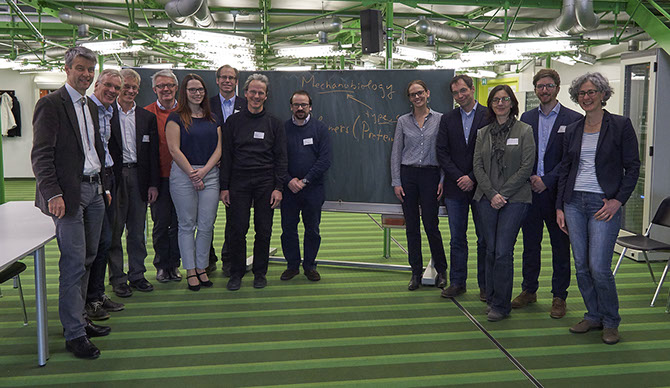
Group photo of organizers and speakers (from left to right): Prof. Horst Fischer, Prof. Andreas Ludwig, Prof. Rudolf Leube, Prof. Reinhard Windoffer, Barbara Nöthel, Prof. Dennis Discher, Prof. Rudolf Merkel, Prof. Lorenzo Moroni, Dr. Laura De Laporte, Prof. Wolfgang Wagner, PD Petra Mela, Dr. Andreas Blaeser, Dr. Brigitte Küppers.
PDF
13. - 17.2.2017
InCeM
Workshop 4: Mid consolidation phase II
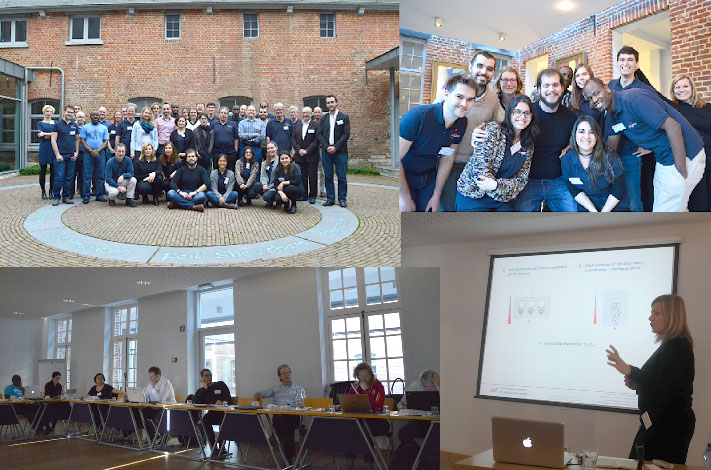
InCeM Members at the Leuven Institute for Ireland in Europe.
10.02.2017
cecam
Cell and tissue motility - workshop
When you are interested in attending this workshop klick here
06.01.2017
InCeM
Marie Skłodowska-Curie Actions Frequently Asked Questions
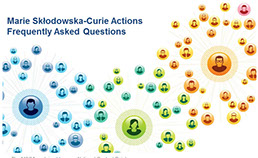 Check out this website, if you have questions related to our Marie Curie Action InCeM. For example, they provide the following explanation of the difference between a short visit and a secondment:
Check out this website, if you have questions related to our Marie Curie Action InCeM. For example, they provide the following explanation of the difference between a short visit and a secondment:
With regard to short visits, these are permitted as well, as long as the concept of short visit is kept. We would like to refrain from defining a time frame of 1-2 weeks because we want to avoid the next question “what about 2 weeks and 1 day - visits”.
The key point is that the short visits should clearly not be secondments. Secondments have a clear impact on the project, are planned before, and have a particular scope – for example, without the secondment the final results of the project would not be possible. A short visit on the other hand will have a limited impact and could be something that arises during the fellowship, so mentioning it in the proposal is not always necessary.
(Answer provided by REA)
21.12.2016
InCeM
Live cell imaging using a smartphone
Johan Kreuger from InCeM partner organisation Uppsala University in Sweden has been in the news. Read the article about a recent study that shows how smartphones can be used to make movies of living cells, without the need for expensive equipment. The study makes it possible for laboratories around the world to do the same thing.
https://www.sciencedaily.com/releases/2016/12/161221141329.htm
22.11.2016
InCeM
A new publication of partner ANDOR
We are happy to announce another publication of partner ANDOR in the Irish Machine Vision and Image Processing Conference Proceedings 2016 (p. 35-42). Thanks to Katerina for her contribution!
16.09.2016
TissueGnostic
Invitation to the TissueGnostics symposium "Optics, Algos and Ice", 17. to 20. of November 2016

"Optics, Algos & Ice"
Symposium on Image
Analysis of Cells in Tissue
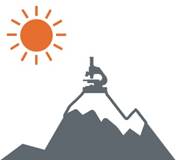
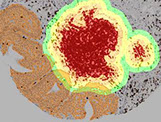
Our partner organisation TissueGnostics is organizing the Optics, Algos and Ice symposium from November 17th to November 20th 2016 in Obergurgl, Tyrol, Austria. The focus of this symposium is on Advanced Digital Microscopy and Image Analysis, its role in revolutionizing clinical diagnostics and in implementing the personalized medicine concept.
PDF
We congratulate Nadieh Kuijpers on the award for her poster "Keratin and actin dynamics during epithelial cell migration" that she presented during the Heraeus-Seminar "Cellular Dynamics". The meeting took place in the Physikzentrum Bad Honnef, Germany, from September 4-7, 2016.
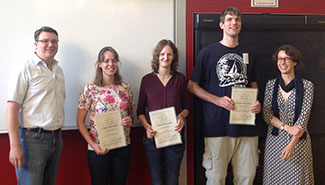
09.08.2016
InCeM
Subgroup Meeting 3
07.2015
19.10.2015
15.02.2016
University of Sussex
3.8 million euros grant success for InCeM's MSCA-ITN-ETN
InCeM
Good project communication - InCeM is on Facebook now
TissueGnostic
Announcement of the TissueGnostics symposium "Optics, Algos and Ice", 17. to 20. of November 2016
Press release
One obligation within our project activities is to ensure a good communication and dissemination of project results. As InCeM mainly consists of young scientists, our Early Stage Researchers started a Facebook page in order to share the project with a broader audience. This communication media is commonly accepted under young people and whenever we have anything to share with the world, we will post the news on Facebook.
Please like us via https://www.facebook.com/IntegratedCEM
We are happy to announce that the first InCeM publication has been accepted and is now online. Congratulations to our project partners ibidi GmbH and University of Sussex!
http://www.sciencedirect.com/science/article/pii/S002192901630118X
Advanced Microscopy & Image Analysis - tools for molecular pathology and personalized medicine at the Obergurgl University Center, Tyrol, Austria
The Department is delighted to announce that a 4-year EU-MSCA-ITN-2014-ETN - Marie Sklodowska-Curie Innovative Training Network (ITN-ETN) grant has been successfully awarded to support Research Training Network on Integrated Component Cycling in Epithelial Cell Motility (InCeM). The grant, worth 3.8 million euros over the four year period is coordinated by Professor Rudolf Leube of RWTH Aachen University in Germany and here at Sussex, Dr Anotida Madzvamuse in Mathematics is one of the 11 key partners from 6 European countries and Israel. In addition, 17 associated partners support the network making it one of the largest ITN. Two out of 15 PhD studentships will be hosted and based at Sussex.
InCeM is focused on cell migration, which is essential for vital processes such as tissue formation, wound healing and tissue invasion during carcinogenesis. It aims to visualize morphological, biochemical and physical processes of cell motility to integrate these data into multi-scale models with the goal to deliberately tune motile behavior in relation to disease. InCeM provides an international and highly interdisciplinary framework of collaborators from academia and industry with core expertise in medicine, biology, biochemistry, image analysis, modelling and engineering.
20.05.2016
InCeM
Award to Victor Juma for being the best graduating student from Nairobi
University of Nairobi Vice Chancellor Peter Mbithi presented a gold medal to Victor Juma. He was recognized as the best male overall student with the highest proficiency in both the academic and extra-curricular activities at the institution. The gold medal is a courtesy of the Gandhi Smarak Nidhi Trustee Fund.
We are happy to announce the upcoming Subgroup meeting 3 at Uniklinik RWTH Aachen (UKA) on 1st September, 2016 with focus on the discussion of results between the experimental and the image processing groups. The meeting will begin with experimental part presented by 5 ESRs from UKA, JUELICH, IBIDI and UDE followed by 3 ESRs from SCCH and ANDOR who will take over the image processing part.
Looking forward to make productive collaborations!
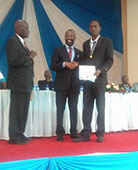

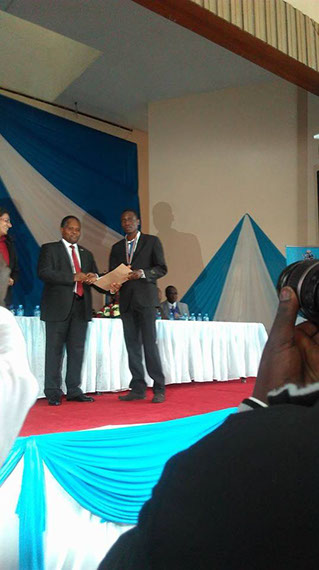
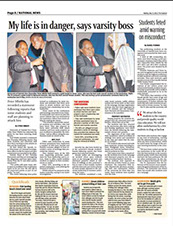
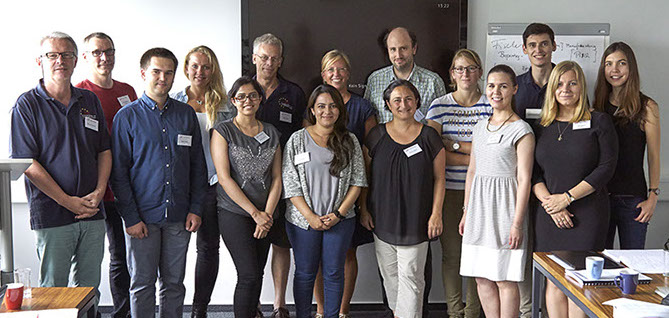
InCeM
First InCeM publication
21.04.2016
13.-24.07.2015
InCeM
Workshop 2, Part 1
16./17.04.2015
InCeM
Kick-Off Meeting
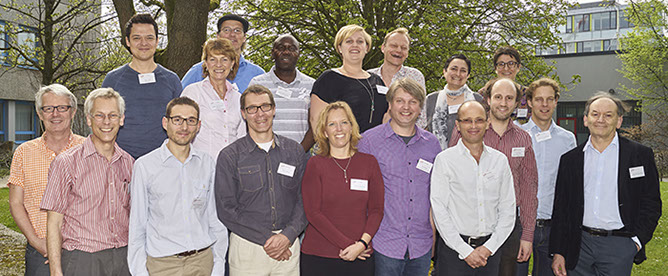
InCeM Members at the Isaac Newton Institute in Cambridge during the 2. InCeM Workshop
The kick-off meeting was attended by representatives of all beneficiaries and several partner organisations with participants from six European countries, Israel, Canada and Singapore. To get to know each other and each other's work each partner provided a ~20 minute presentation on the first day. These introductions set the stage for intense discussions. The late afternoon was reserved for learning about EU rules and regulations, which were competently showcased by our project manager Christine Kempchen. After a "night in the city" we skype interviewed almost 30 fellowship candidates that had been selected from more than 330 applicants. Rigorous organisation helped us to stay on time and to come up with recommendations for each project. The final meeting and subsequent excursion to the city with a performance of Mendelssohn's "Elias" in the Aachen cathedral completed the meeting leaving all of us with a feeling of exciting anticipation for the future of InCeM. (Impressions)
10.02.2015
InCeM
Announcement for 15 PhD students is online.
21.01.2015
Mediziner-Aachen.de
09.01.2015
InCeM
InCeM website starts.
23.12.2014
InCeM
GRANT Agrement signed.
With the signing the Grant Agrement InCeM will start as planned in January 2015.
Last update: 26.09.2018
incem@rwth-aachen.de
NEWS
January, 2019
InCeM
End of the InCeM Project
December 2018
InCeM
Last and final deliverable D6.4
“PhD theses” published!
November 2018
InCeM
A new publication of partner Forschungszentrum Jülich
GALLERY
Migrating primary keratinocyte with labelled cell adhesions. Based on a fine tuned regulation adhesion structures are continuously formed, modified and finally disassembled.
Primary keratinocytes apply traction forces upon migration. Using fluorescent fusion proteins (GFP-vinculin), adhesion structures can be visualized. Those sites are used by the cell for cell force transmission to the underlying substrate. In case those substrates are elastic, forces cause deformation fields that can be visualized using marker particles.
A typical example of the application of the evolving surface finite element method when solving partial differential equations of reaction-diffusion type on an evolving closed surface representing an evolving tumour.
A typical example of the application of the evolving surface finite element method when solving partial differential equations of reaction-diffusion type on an evolving open surface.
Time-lapse recordings of HK18-YFP fluorescence (left) of a migrating EK18-1 cell displaying multiple emerging KFPs in the proceeding lamellipodium. (Kölsch et al., 2010)
Induction of cell border dynamics through UV-light induced activation of pa-rac.
<
>
This project has received funding from the European Union’s Horizon 2020 research and innovation programme under the Marie Sklodowska-Curie grant agreement No 642866.


